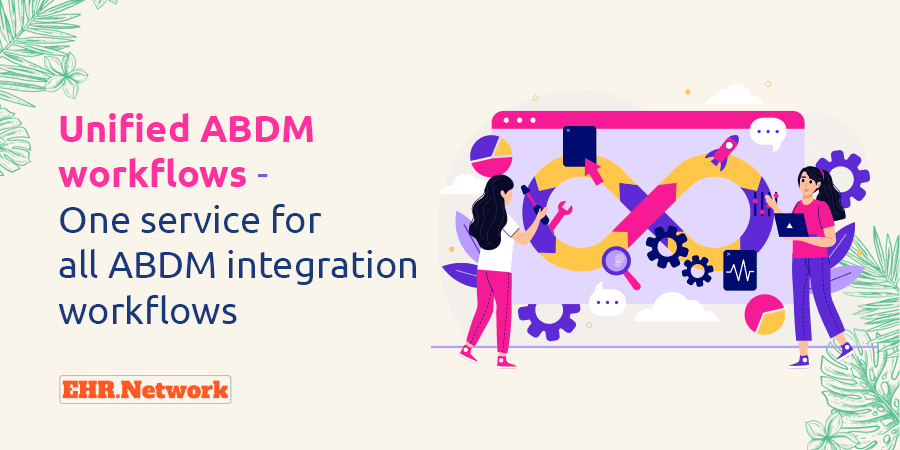Unified ABDM workflows – One service for all ABDM integration workflows

Key advantage that ABDMc provides to existing healthIT systems is the availability of all ABDM workflows in one place. It helps integrators reduce time, effort and cost to integrate to ABDM sandbox environment, obtain functional certification, WASA and go live on ABDM production environment.
We have designed the solution as a collection of multiple services, that implement the full ABDM workflows, for enhanced security, scalability, performance and availability.
A significant portion of the ABDM functionality is exposed through asynchronous APIs, which most healthIT systems are not designed to handle. Using ABDMc, we convert these to the much simpler synchronous APIs, thus making the integration simple for you. ABDMc manages all the complexities such as transaction management, request queues and data caching to simplify your application side integration.
The HIU & HIP APIs on ABDM enable consent based exchange of clinical data of persons. Considering the sensitivity of the exchanged data, ABDMc implements required security features and encryption algorithms. This helps in shielding your healthIT systems from these complexities. Hence, your HealthIT systems only need to implement simple interfaces that consume ABDMc APIs.
The ABHA APIs on ABDM do not involve any clinical data exchange and all the information that is exchanged is created/managed by ABDM. However access to these APIs requires the acquisition and management of sensitive information such as the authorization token. ABDMc relieves your applications from such tasks by managing them centrally.
ABDMc covers the entire gamut of PHR APIs and can be used by any developer building an ABDM certified PHR application.
ABDM integration requires the applications to manage a large number of control flow related data and artifacts such as consent requests, consents, subscription requests etc. Since these are all managed by ABDMc, your applications can remain focused on their core functionality.
Our simplified ABDMc APIs, along with associated Openapi 3.0 documentation and detailed developer documentation, allows you to complete the ABDM integration with minimal knowledge of the ABDM network.
Another key requirement for ABDM integration is to implement call back APIs that are exposed to the internet for external entities. This opens up big security risks that applications are required to manage. Using ABDMc, we help you abstracts these from the core digital health system, thereby minimizing the security risks. Further ABDMc implements security measures such as IP restriction, rate limiting, bot blocking and JWT validation to mitigate risks for the entire IT system.
Over the ABDM network, clinical data is exchanged as FHIR document bundles following the ABDM FHIR implementation guidelines. You require a thorough understanding of FHIR for implementing this. Further these FHIR bundles are secured over the wire using complex data encryption techniques. ABDMc reduces the learning curve for app developers by implementing the required data mappings and encryption logic.
Also read
- About ABDMc
- Deployment modes
- ABDM middleware for a standards compliant integration middleware.
- Ayushman Bharat Digital Mission, The backbone to support an integrated digital health infrastructure for India
Features
- All ABDM workflows in one place
- ABHA creation
- ABHA verification & linking
- Discover & link careContexts
- Link new careContexts
- Notify new hiTypes
- Receive consent notifications
- Share data as FHIR documents
- Make consent requests
- Make data requests
- Receive & process data
- Make subscription requests
- Manage consents
- Manage subscriptions
- Manage ABHA profile
- ABHA workflows
- HIP workflows
- HIU workflows
- PHR workflows